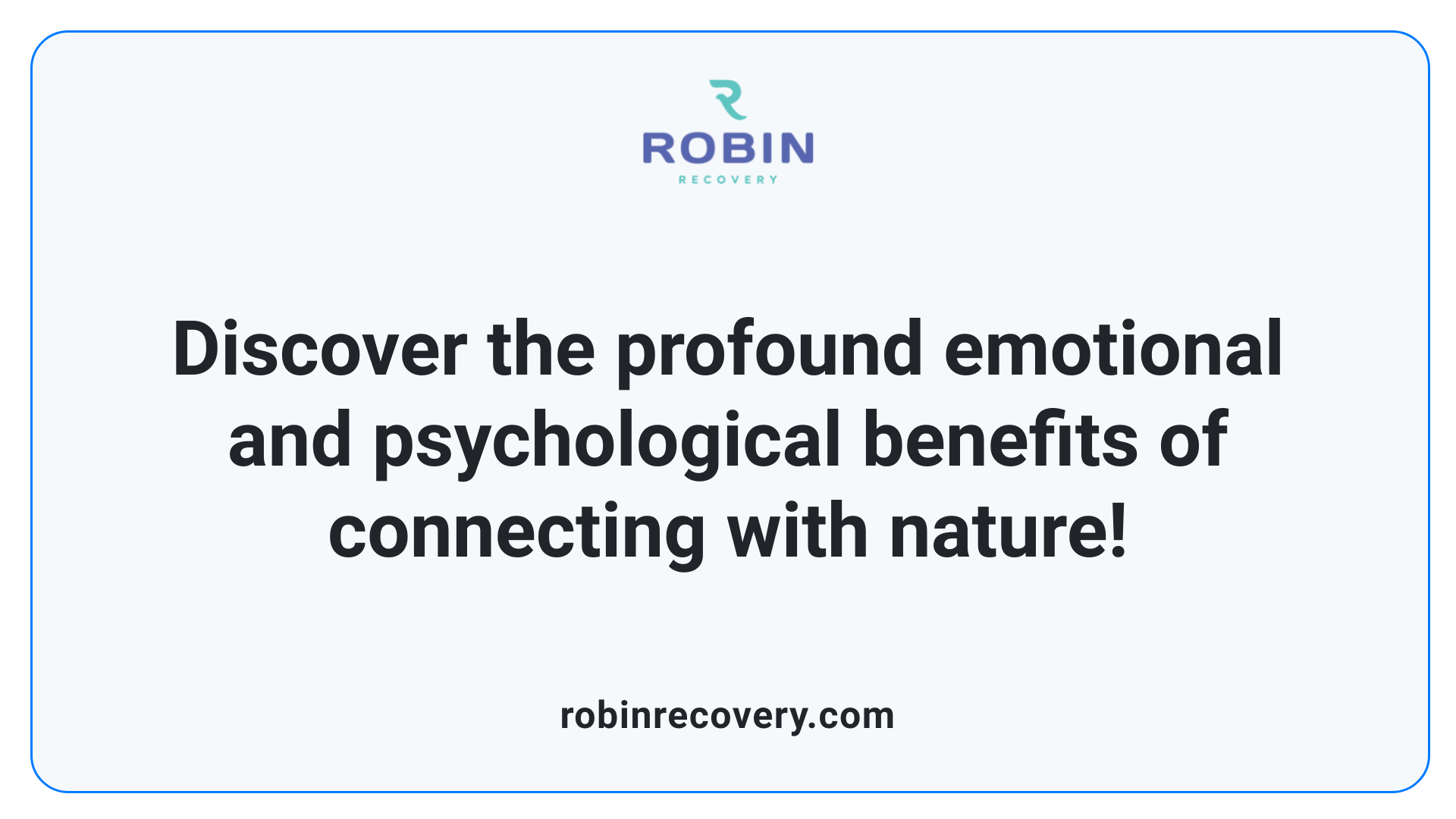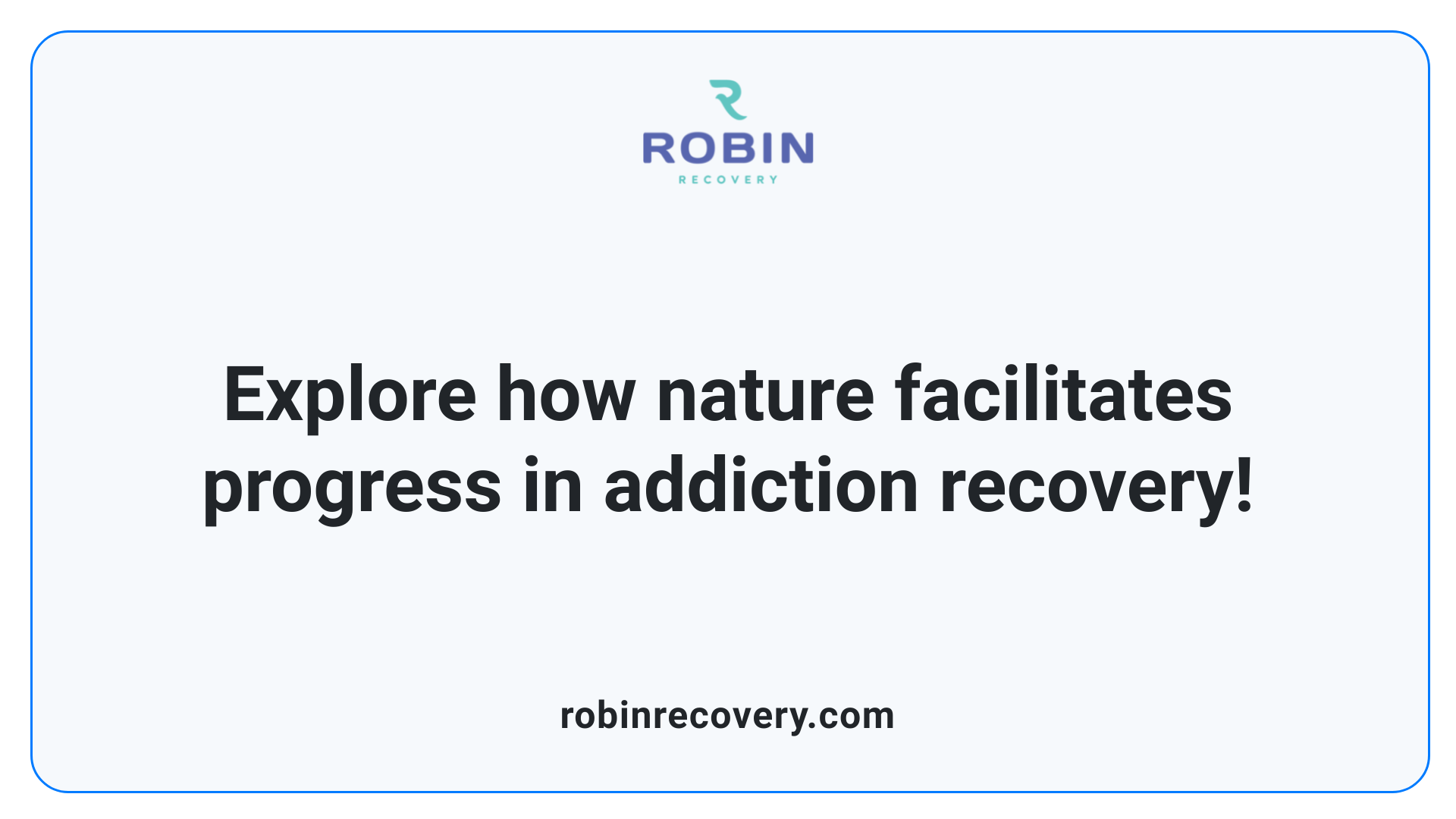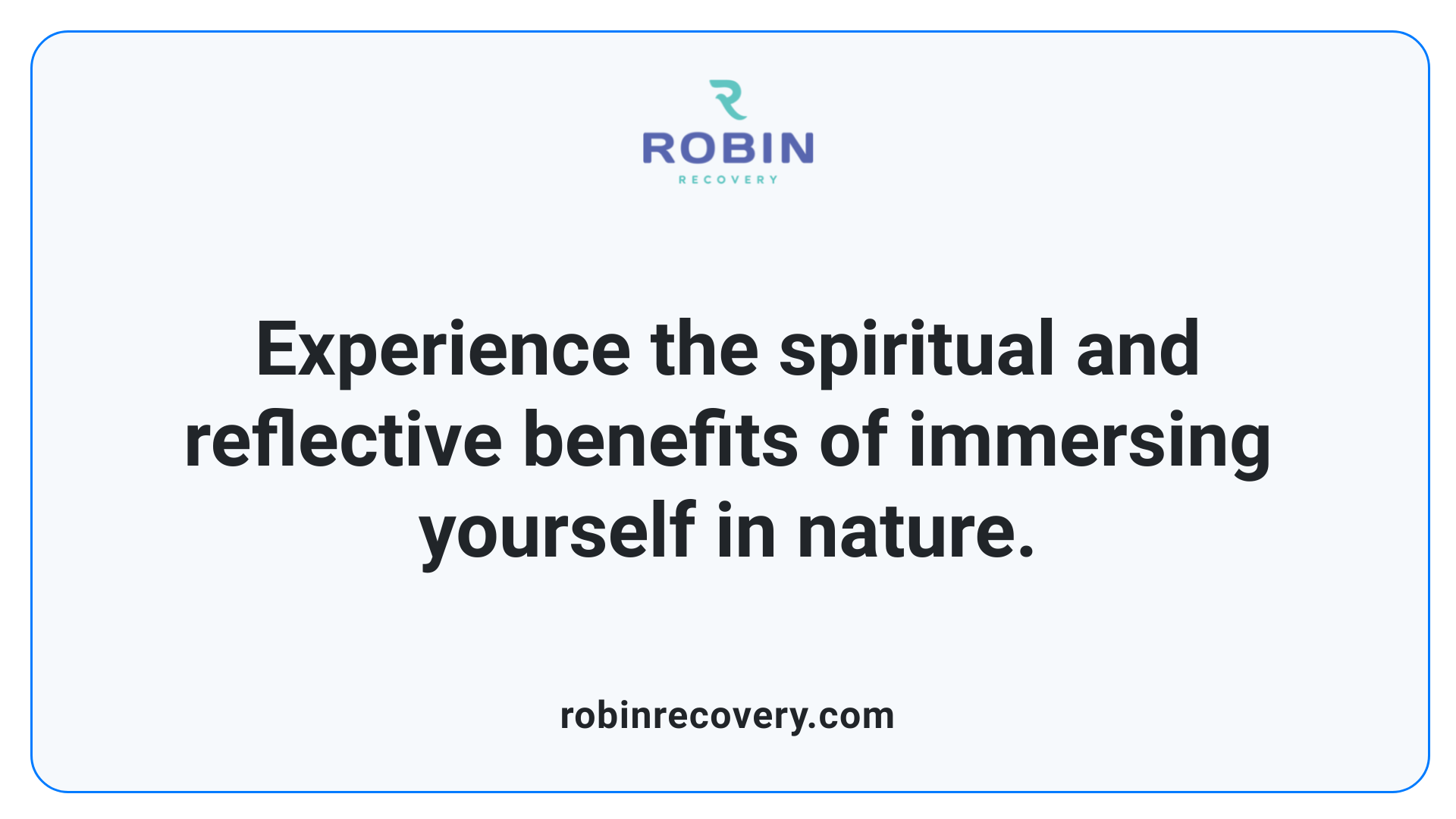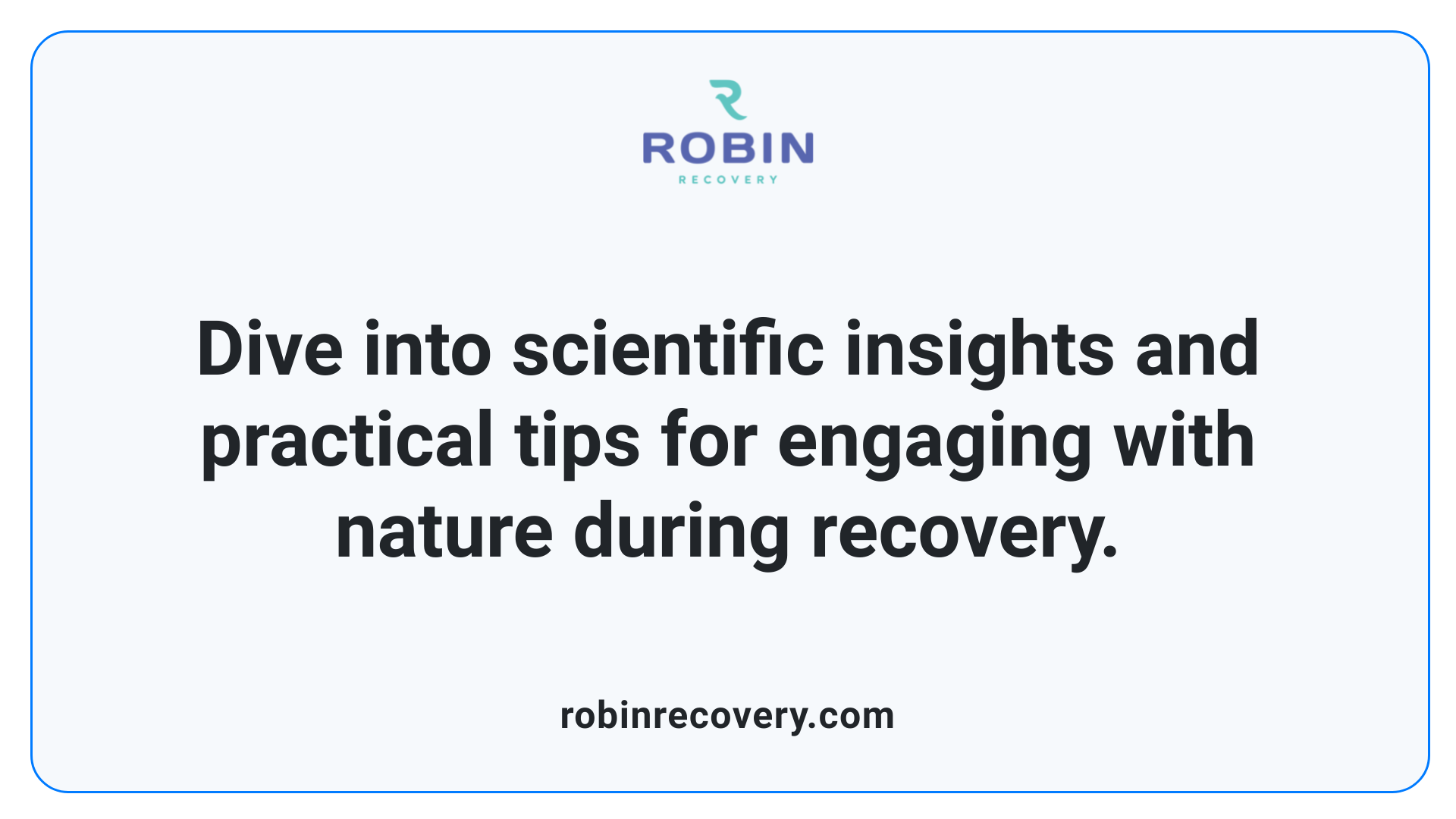Recovery and Spending Time in Nature

Nature as a Healing Companion in Recovery
Spending time in nature offers a myriad of benefits for individuals on a journey of recovery, whether heeding the path from addiction or navigating mental health challenges. It serves as a therapeutic oasis, offering emotional solace, physical rejuvenation, and a deeper sense of mindfulness — all crucial elements to both initiating and sustaining recovery. This article explores the powerful connection between natural environments and recovery, highlighting scientific insights, practical tips, and the transformative impact of nature on mental, emotional, and spiritual well-being.
Emotional and Psychological Benefits of Nature

What are the emotional and psychological benefits of spending time in nature?
Spending time in nature offers substantial emotional and psychological benefits, including reduced stress and improved mood. Exposure to natural environments has been shown to enhance happiness while simultaneously lowering anxiety and depression levels, which are common challenges faced by individuals recovering from addiction.
Engaging with nature can provide a powerful antidote to feelings of loneliness and isolation often experienced during recovery. Activities like walking in parks, gardening, or simply enjoying green spaces not only promote physical fitness but also serve as opportunities for social interactions, helping to cultivate new relationships essential for healing.
Moreover, research suggests that time spent outdoors leads to decreased cortisol levels, which translates to lower stress levels. This reduction in stress can help alleviate the overwhelming urges and cravings that may lead to relapse. Many individuals find that nature stimulates their cognitive processes, enhancing focus and decision-making abilities—a vital aspect during the recovery journey.
Overall, nurturing a sense of connectedness to nature can significantly enhance emotional resilience, making it a valuable component of addiction recovery programs. Addressing barriers to access these green spaces is important, ensuring equitable opportunities for all to foster better mental health.
Nature's Impact on Addiction Recovery

How does being in nature aid recovery from addiction?
Being in nature aids recovery from addiction by promoting feelings of pleasure and well-being, which are crucial for individuals overcoming substance abuse. Natural settings reduce stress and anxiety, decreasing cortisol levels and improving mood, essential for addressing substance use disorders.
Engaging with the great outdoors facilitates mindfulness practices such as meditation, allowing individuals to connect with their thoughts more deeply during their recovery journey. Activities enjoyed outside, like hiking or gardening, not only enhance physical health but also release beneficial hormones like serotonin and dopamine, which are effective in alleviating anxiety and depression.
Moreover, the absorption of Vitamin D through sunlight exposure strengthens the immune system, vital for overall health during recovery. As individuals connect with nature, they also develop deeper social connections and empathy, which are supportive elements in their sobriety journey. The calming influence of natural environments offers a significant respite from the overwhelming thoughts and triggers associated with addiction, helping to create a safer and healthier path towards recovery.
Embracing Holistic Recovery Strategies
Incorporating holistic recovery strategies within nature significantly enhances the healing experience. These can include:
- Mindful Walking: Encourages a deeper connection with surroundings, improving focus and calming the mind.
- Outdoor Journaling: Provides a peaceful space for self-reflection and emotional processing.
- Engaging in Ecotherapy: Blends nature with therapy, supporting social interactions and reducing feelings of isolation.
- Volunteering in Conservation: Fosters connections with community, contributing to a sense of purpose and belonging.
The Role of Nature in Supporting Sobriety
Regular exposure to green spaces and outdoor activities can decrease relapse potential by improving mental wellness. Individuals who spend time outdoors report:
- Reduced Stress Levels: Leading to fewer instances of anxiety and cravings.
- Improved Sleep Patterns: Helping regulate circadian rhythms which is crucial for recovery.
- Increased Happiness and Self-Esteem: Nature-driven activities provide joy and fulfillment, key ingredients for long-term sobriety.
By embracing nature and its healing capabilities, those in recovery can better manage the challenges ahead and nurture their journey to lasting sobriety.
Nature's Role in Stress Reduction and Mindfulness

What role does nature play in reducing stress and enhancing mindfulness?
Nature plays a significant role in reducing stress and enhancing mindfulness by providing a calming environment that helps to soothe the nervous system. One of the most important aspects is its ability to lower stress hormones like cortisol and adrenaline. Spending time outdoors, whether it’s hiking through wooded areas or simply sitting in a park, allows individuals to reconnect with the natural world. This connection promotes physical well-being and releases endorphins, which elevate mood and create a sense of joy.
Engaging in activities like mindful walks or journaling outdoors encourages mindfulness by engaging all the senses. For example, the sound of rustling leaves or the sight of vibrant flowers fosters appreciation for the surroundings. This sensory engagement helps clear the mind and encourages a focus on the present moment, essential for effective stress management.
Benefits of outdoor activities
Regular exposure to nature not only alleviates immediate stress but also yields long-term mental health benefits. Here are some of the advantages of outdoor activities:
Benefits Description Improved mood Nature activities elevate mood, reducing feelings of anxiety. Enhanced creativity Time spent outdoors can boost problem-solving skills and creativity. Better sleep quality Natural light exposure helps regulate circadian rhythms for restful sleep. Increased resilience Boosted immune function through Vitamin D supports overall health.
Ultimately, engagement with nature creates not only a soothing influence but also offers insights into environmental stewardship and self-awareness, vital for individuals on the recovery journey.
Spiritual and Reflective Benefits of Nature

What are the spiritual and reflective benefits of spending time in nature?
Spending time in nature offers numerous spiritual and reflective benefits, including enhanced relaxation and reduced stress, which are foundational for spiritual well-being. The calming environment of natural settings can facilitate meditation, helping individuals lower their heart rates and relieve tension. This tranquility provides the perfect backdrop for spiritual practices, such as reflection and prayer.
Additionally, being outdoors helps alleviate mental fatigue, leading to increased feelings of joy and happiness. Engaging with nature can enhance focus, creativity, and self-esteem, enriching reflective practices and personal growth. For instance, activities like journaling outdoors allow individuals to connect deeper with their thoughts in a serene environment.
Ultimately, engaging with the natural world promotes a deeper connection with oneself. It fosters a sense of peace and clarity essential for spiritual health, allowing individuals on their recovery journey not just to heal but to thrive.
Scientific Insights and Practical Tips on Nature in Recovery

Scientific studies on nature's benefits
Research strongly supports the mental health benefits of spending time in nature, particularly for individuals recovering from addiction. Studies indicate that even brief exposure to natural environments can significantly reduce stress and anxiety, decrease cortisol levels, and improve feelings of happiness and relaxation. One powerful concept known as the 3-Day Effect suggests that spending just three days in nature can enhance problem-solving abilities and creativity by around 50%. This phenomenon showcases how nature can help clear the mind, providing a retreat from the pressures of daily life, which is essential for those in recovery.
Practical strategies for nature engagement
To maximize the benefits of nature during recovery, individuals can incorporate various outdoor activities into their routines:
- Gardening: Connects you with the earth and improves mental and physical health through beneficial microbes.
- Mindful walks: Engaging in quiet, reflective walks in wooded or green areas can reduce feelings of anxiety and improve focus.
- Outdoor meditation: Provides space for self-reflection in a calming environment, which enhances emotional well-being.
- Volunteering for conservation: Strengthens community ties and fosters a sense of purpose while connecting with nature.
Limitations and barriers
While nature offers numerous benefits, there are potential drawbacks to consider. For instance, individuals may encounter unpleasant environmental factors, such as extreme weather, pollution, or dangerous wildlife, which can overshadow the positive impacts of being outdoors. Moreover, the increasing urbanization poses barriers to easy access to natural spaces, particularly for those living in densely populated areas. By understanding these limitations, we can implement strategies to improve access to green spaces, ensuring everyone can reap nature's therapeutic benefits without undue obstacles.
Embracing Nature in the Recovery Journey
The journey to recovery is deeply personal and complex, yet incorporating nature into the process can provide invaluable support. From reducing stress and enhancing mindfulness to fostering spiritual reflection and improving mood, the benefits of nature are manifold and well-documented. By understanding and overcoming barriers to accessing natural environments, particularly for marginalized groups, we can ensure that everyone can harness the healing power of nature. Engaging with the natural world not only augments traditional recovery strategies but also enriches our lives with peace, joy, and a deeper sense of connectedness.
References
- Health Benefits of Spending Time in Nature During Recovery
- How nature benefits mental health - Mind
- How Nature Can Benefit Your Addiction Recovery - Pinelands
- 3 ways getting outside into nature helps improve your health
- Spending Time in Nature Helps Addiction Recovery
- Why Spending Time Outdoors is Beneficial for Recovery
- Connect with Nature to Help Recovery - Ashley Addiction Treatment
